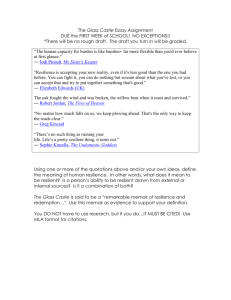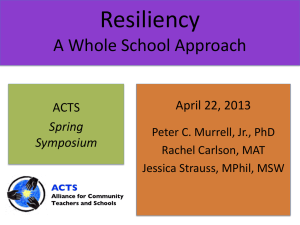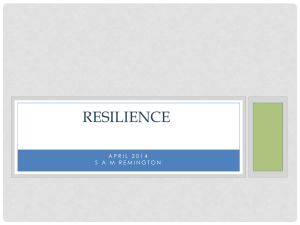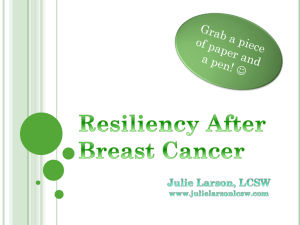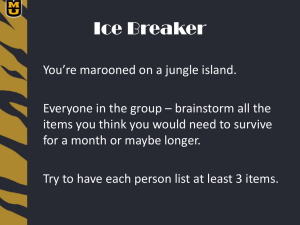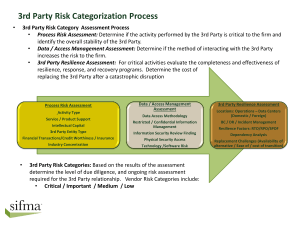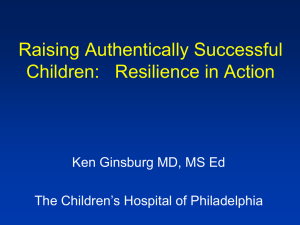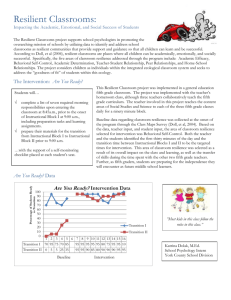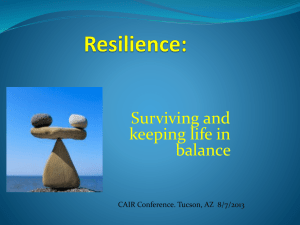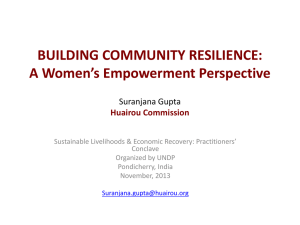Building Resilience in Children
advertisement
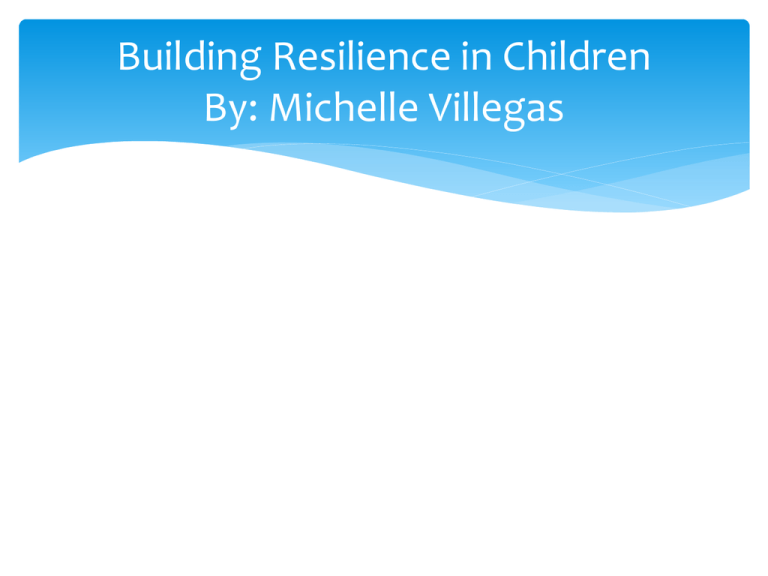
Building Resilience in Children By: Michelle Villegas What is Resilience ? Resilience can be thought of as our ability to bounce back, or even grow, in the face of pressures and threats Signs of a Resilient Child The capacity to have courage The motivation to move forward The power to stay centered The awareness of knowing themselves The gift of laughter The ability to bounce back The potential of showing promise The capacity to ask for help The tenacity to accomplish goals The willingness to share feelings The capability to connect with others The inspiration to give back ( Linda Goldman, 2004) Seven C’s of Resilience By: Dr. Ginsburgh, M.D., MS Ed, FAAP Competence: Help your child focus on their individual strengths. Empowering your child to make decisions Be mindful that your desire to protect your child doesn’t mistakenly send the message that you don’t think they are competent to handle situations Confidence Clearly expressing the qualities such as fairness, kindness, persistence, and integrity Authentic praise: praising honestly about specific achievements Focus on the best in each child so that he or she can see that, as well Connection Building a sense of physical safety and emotional security within your home. Allowing the expression of emotions, so that kids will feel comfortable reaching out during difficult times Foster healthy relationships that will reinforce positive messages Character Demonstrate how behaviors impact others Help your child recognize him/herself as a caring person Demonstrate the importance of community Contribution Stress the importance of serving others by modeling generosity Creating opportunities for each child to contribute in some specific way Coping Modeling effective coping on a consistent basis Guiding the child to develop positive coping strategies Control Help your child understand that discipline is about guiding and teaching Teach children that about the impact of choices and actions Three Resources of Resilience To overcome adversities, children draw from three sources of resilience : I HAVE I AM I CAN I HAVE… People around me I trust and who love me, no matter what People who set limits for me so I know when to stop before there is danger or trouble People who show me how to do things right by the way they do things People who want me to learn to do things on my own People who help me when I am sick, in danger or need to learn I AM A person people can like and love Glad to do nice things for others and show my concern Respectful of myself and others Willing to be responsible for what I do I CAN… Talk to others about things that bother or frighten me Find ways to solve problems that I face Control myself when I feel like doing something not right or dangerous Figure out when it is a good time to talk to someone or to take action Find someone to help me when I need it (International Resilience Project) Building Resilience at Home Define Resiliency Create a dialogue (books, quotes, movies) Share a resilient role model Create a resilient book or coping book Discuss the resilience inventory Draw resiliency: Draw a representation of what resiliency looks like/feels like inside of you Resilience Inventory Identify a difficult time where they used strength and courage to make it through. Explain that is an example of resiliency. Help them identify these attributes and relate them to present and future uses. Discuss a time in your life when you felt you where resilient. How did people respond? What did they say? How did that make you feel? How does it feel now? Is there anything you wish others had done? Can you use what you learned from this experience now? (Linda Goldman. 2004) References Ginsburg, Kenneth (2011). A Parent’s Guide to Building Resilience in Children and Teens: Giving Your Child Roots and Wings, American Association of Pediatrics Goldman, Linda (2004). Raising Our Children to Be Resilient: A Guide to Helping Children Cope with Trauma in Today's World, Routledge Nan Henderson: www.resiliency.com References www.centerforresilientchildren.org/preschool/assess ments-resources Resilience Project: internationalresilience.org
